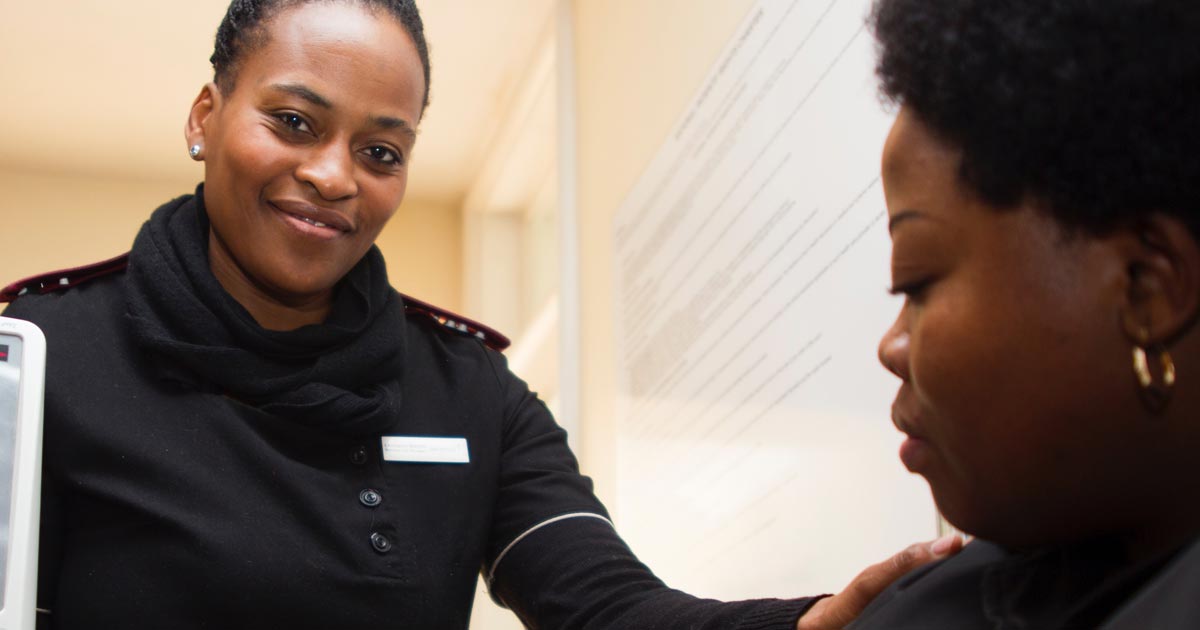According to the Centers for Disease Control and Prevention, an average of 12,000 women are diagnosed with cervical cancer every year in the United States.
Ann Donnelly, Vice President of Care Management, Priority Health, notes the number used to be much higher and that over recent decades, cervical cancer diagnoses and deaths have decreased significantly.
Why is that?
"We can credit this decline in cervical cancer to more women getting Pap tests or HPV vaccinations, which are the main way to prevent the disease," said Donnelly, noting that even though all women are at risk, cervical cancer occurs most often in women over age 30, which is why it's important to begin Pap tests at age 21 and receive an HPV vaccine during pre-teen years.
Cervical cancer—a type of cancer that occurs in the cells of the cervix, which is the lower, narrow end of the uterus—is most commonly caused by the human papillomavirus.
"HPV is a sexually transmitted infection that most sexually active people will contract at some point in their lives," said Donnelly. "While HPV does not always cause cervical cancer, it plays a major role in most cases."
The two ways to prevent cervical cancer or find it during its early stages, Donnelly said, are through a Pap test or an HPV test.
"The Pap test will identify any cell changes on the cervix that may lead to cancer and is also effective in finding cervical cancer in the early stages," explained Donnelly. "An HPV test looks for the human papillomavirus that can cause precancerous cell changes and cervical cancer. To receive a Pap and/or HPV test, women should find an OB/GYN that offers these types of services."
Contrary to popular belief, most insurance plans will cover preventive care, which includes health care services that help people avoid health problems or find them early, when they are more treatable.
"At Priority Health, our no-cost preventive care includes HPV vaccinations for both men and women, as well as regular cervical cancer screenings," said Donnelly, adding that low-income patients or those without health insurance may qualify for free or low-cost cervical cancer screenings through the CDC's National Breast and Cervical Cancer Early Detection Program.
"At the end of the day, health insurance companies want to help their members live healthy lives, and that includes simple screenings that could potentially save them from developing cancer."
Cervical cancer is the easiest gynecological cancer to prevent with regular screenings tests and follow-up. It's also highly curable when found and treated early. If someone discovers cervical cancer in the later stages, the risks of death increases.
"Because the disease is so preventable, we want to encourage everyone to get screenings and/or vaccinations, so they don't have to resort to harsh treatments such as surgery, chemotherapy, or radiation therapy," said Donnelly. "Anyone who is diagnosed with cervical cancer should seek treatment from a gynecologist oncologist, who is trained to treat these types of cancers."
It's vital to also have candid conversations with your children—male and female—about ways to be safe.
"In addition to preventive screenings and the HPV vaccination, another way to prevent cervical cancer is by practicing safe sex," said Donnelly. "Because children can get the HPV vaccination as early as age 9, because the vaccine produces a strong immune response when taking during preteen years, you may find yourself needing to have the 'sex' talk earlier than planned with your children."
Some things to talk about with your children when the time comes are:
- Only have sex if you are in a committed relationship and are comfortable with the other person.
- Always use condoms, which will limit the skin-to-skin contact of potentially HPV-infected areas.
- Commit to getting regular cervical cancer screenings.
"It's important to remember that even if women have had the HPV vaccine, you still need regular Pap tests to screen for cervical cancer," said Donnelly. "The HPV vaccination protects against the types of HPV that most often cause cervical cancer, but it's not a silver bullet."
If your doctor tells you that you have contracted HPV, Donnelly said it's not something that should devastate you, as most sexually active people will have HPV at some point in their lives, but few will get cervical cancer.
"At any time, there are approximately 79 million people in the U.S. with HPV," said Donnelly. "Those who contract HPV should simply plan for getting their regular screenings and commit to staying on top of it."
Smoking can also lead to cervical cancer, so it's vital for those who are still smoking to speak with their doctor about a cessation plan.
Though January is Cervical Health Awareness Month, it's important to know the ways cervical cancer can be prevented and treated, year-round.

Ann Donnelly, Vice President of Care Management for Priority Health.
Written by Sarah Suydam, Staff Writer for West Michigan Woman.
Photo courtesy of Priority Health.




